I enjoy Trollope in general and this series particularly. He has great command of the language, his descriptive details are vivid, the chief characters are well drawn, and the plots, if not riveting, are, at worst, diverting.
Still, ...
There is much to offend modern sensibilities. Trollope and his characters love fox hunting and take pleasure in the death of the fox. He and they rarely question class distinctions and believe that personal merit is as likely to be bred as acquired. While the traits of people in upper classes are satirized, people in the lower ones are shown to be less amenable to refined humor; their comic presence can be demeaning, as it is with Shakespeare's clowns. Trollope appreciates alike the delusions and clear purposes of his main characters and he lovingly makes fun of them, but he caricatures the lesser ones and allows them to be subjected to the meanness of the time's upper-class prejudices.
Politics and alliances are his main subject. Of alliances, the chief ones are between men and women. He gives striking portraits of intense friendship and makes much of the misunderstandings that can arise when men and women form them with each other. Similarly, he shows the culture's complex attitudes towards courtship and marriage. Marriage for love and love alone is exceptional. Most courting is premeditated with both sides calculating their relative advantage by possession of money, physical attractiveness, social rank, and character traits. Calculating their advantage and then weighing the chances of happiness with the prospective mate.
Trollope is famous for showing women who possess courage, tenacity, and flair. They may make poor choices but, whether they do or not, they remain true to themselves, their families, their friends, and the cultural values that guide them.
He is also famous for depicting the struggles among his male characters to achieve and sustain position, honor, and public recognition. Here, for example, is part of a section on an unfolding battle between the heads of the Liberal and Conservative parties in the House of Commons:
A man destined to sit conspicuously on our Treasury Bench, or on the seat opposite to it, should ask the gods for a thick skin as a first gift. The need of this in our national assembly is greater than elsewhere, because the differences between the men opposed to each other are smaller. When two foes meet together in the same Chamber, one of whom advocates the personal government of an individual ruler, and the other that form of State, which has come to be called a Red Republic, they deal, no doubt, weighty blows of oratory at each other, but blows which never hurt at the moment. They may cut each other’s throats if they can find an opportunity; but they do not bite each other like dogs over a bone. But when opponents are almost in accord, as is always the case with our parliamentary gladiators, they are ever striving to give maddening little wounds through the joints of the harness. What is there with us to create the divergence necessary for debate but the pride of personal skill in the encounter? Who desires among us to put down the Queen, or to repudiate the National Debt, or to destroy religious worship, or even to disturb the ranks of society? When some small measure of reform has thoroughly recommended itself to the country — so thoroughly that all men know that the country will have it — then the question arises whether its details shall be arranged by the political party which calls itself Liberal — or by that which is termed Conservative. The men are so near to each other in all their convictions and theories of life that nothing is left to them but personal competition for the doing of the thing that is to be done. It is the same in religion. The apostle of Christianity and the infidel can meet without a chance of a quarrel; but it is never safe to bring together two men who differ about a saint or a surplice.Trollope also makes good use of literary allusion. In Phineas Redux, for example, he draws from Milton's short poem, Lycidas. Milton compares Lycidas to the sun which must set, but which also rises again in glory. He says at the end of night the sun "tricks his beams" and "flames in the forehead of the morning sky:"
Weep no more, woful Shepherds weep no more,Trollope uses the expression twice in Phineas Redux, both times in association with Phineas himself and with Lady Laura, a woman whose tragedy it is to have married another despite her love for him.
For Lycidas your sorrow is not dead,
Sunk though he be beneath the watry floar,
So sinks the day-star in the Ocean bed,
And yet anon repairs his drooping head,
And tricks his beams, and with new-spangled Ore,
Flames in the forehead of the morning sky:
So Lycidas sunk low, but mounted high,
Through the dear might of him that walk'd the waves;
Milton: Lycidas cont.
Where other groves, and other streams along,
With Nectar pure his oozy Lock's he laves,
And hears the unexpressive nuptiall Song,
In the blest Kingdoms meek of joy and love.
On page 58 of the Oxford edition, Lady Laura writes to Phineas, using the phrase to describe the turnaround of her beloved brother Oswald:
To me it is all one tragedy. I cannot but think of things as they were two or three years since. My father and my husband were both in the Cabinet, and you, young as you were, stood but one step below it. Oswald was out in the cold. He was very poor. Papa thought all evil of him. Violet had refused him over and over again. He quarrelled with you, and all the world seemed against him. Then of a sudden you vanished, and we vanished. An ineffable misery fell upon me and upon my wretched husband. All our good things went from us at a blow. I and my poor father became as it were outcasts. But Oswald suddenly retricked his beams, and is flaming in the forehead of the morning sky. He, I believe, has no more than he had deserved. He won his wife honestly;--did he not? And he has ever been honest. It is my pride to think I never gave him up. But the bitter part of my cup consists in this,--that as he has won what he has deserved, so have we. I complain of no injustice. Our castle was built upon the sand. Why should Mr. Kennedy have been a Cabinet Minister;--and why should I have been his wife? There is no one else of whom I can ask that question as I can of you, and no one else who can answer it as you can do.And on p. 175 of the same Trollope uses the phrase in referring back to an earlier time in which Phineas recovered from her rejection of his marriage proposal:
She, with the imperturbable serenity of a matured kind-hearted woman, had patted him on the back, as it were, as she told him of her existing engagement with Mr. Kennedy. Could it be that at that moment she could have loved him as she now said she did, and that she should have been so cold, so calm, and so kind; while, at that very moment, this coldness, calmness, and kindness was but a thin crust over so strong a passion? How different had been his own love! He had been neither calm nor kind. He had felt himself for a day or two to be so terribly knocked about that the world was nothing to him. For a month or two he had regarded himself as a man peculiarly circumstanced,--marked for misfortune and for a solitary life. Then he had retricked his beams, and before twelve months were passed had almost forgotten his love. He knew now, or thought that he knew,--that the continued indulgence of a hopeless passion was a folly opposed to the very instincts of man and woman,--a weakness showing want of fibre and of muscle in the character. But here was a woman who could calmly conceal her passion in its early days and marry a man whom she did not love in spite of it, who could make her heart, her feelings, and all her feminine delicacy subordinate to material considerations, and nevertheless could not rid herself of her passion in the course of years, although she felt its existence to be an intolerable burden on her conscience. On which side lay strength of character and on which side weakness? Was he strong or was she?
Notes:
Trollope liked the phrase well enough to use it in other novels, including The Small House at Allington and The Claverings.
Milton used a variant of the expression in Il Penseroso line 123
Till civil-suited Morn appeer,Of Milton's use of the word tricks and other nearby words in Lycidas, Homer Baxter Sprague explains:
Not trickt and frounc't as she was wont,
With Attick Boy to hunt,
But Cherchef't in a comly Cloud.
Tricks (Welsh treciaw, to furnish ; or, better, from Dutch trek, a draught; pull; deceit; feature; whence, perhaps, though Wedgwood doubts it, comes Fr. tricher, to cheat; Ita1. treccare), dresses, sets off. "Tricked," says Dyce, "is properly an heraldic term = blazoned."A set of pages called jimandellen.org reproduces illustrations from Trollope novels, including Phineas Finn and Phineas Redux, from which these come.
Spangled (Gaelic spang, a shining metal plate). Milton often uses this word; but, like tinsel, it 'has lost somewhat of dignity.' See Trench (Study of Words, and English Past and Present).
Ore. In Shakespeare (as in Hamlet, IV. i. 24, 25, 'like some ore among a mineral of metals base') we have 'ore' meaning gold, or golden splendor. 'Ore' would seem to be more appropriate to the sun than to a star.
Forehead. In the Puritan Sylvester's translation of the Divine Weeks and Works of the Protestant Du Bartas, a favorite book of Milton's, we find the line,— Oft seen in forehead of the frowning skies.That walked the waves. Matt. xiv. 25, 26 ; Mark vi. 48, 49. The student will not fail to observe the beautiful appropriateness of this allusion to Christ's power over the waters.
Other groves and streams than those which he used to frequent on earth.
Along = beside, 'without the usual idea of motion.' Jerram.
Nectar, the drink of the gods. " It was also used by way of ablution to preserve immortality."
Laves. So the 'aged Nereus' 'reared the lank head' of the drowned Sabrina,And gave her to his daughters to imbatheOozy (A.-S. wos, juice; wosig, juicy; Provincial Eng. ouse, the liquor in a tanner's vat).
In nectared lavers.
- Comus, 836, 837.
Unexpressive, inexpressible, ineffably sweet. So Shakespeare has 'the fair, the chaste, and unexpressive she.' As You Like It, III. ii. 10.
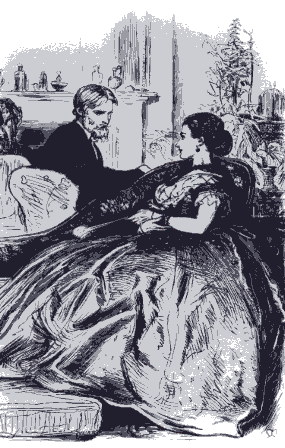
Phineas and Laura
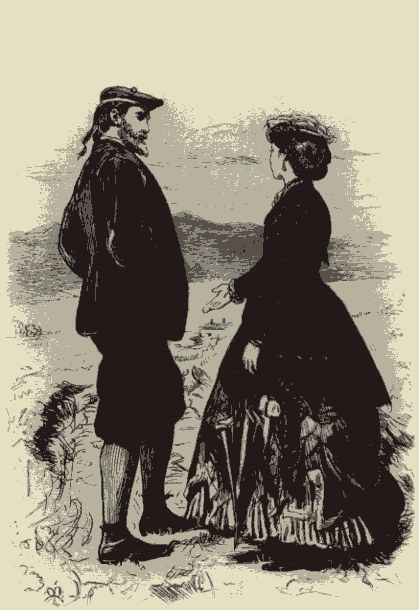
Same
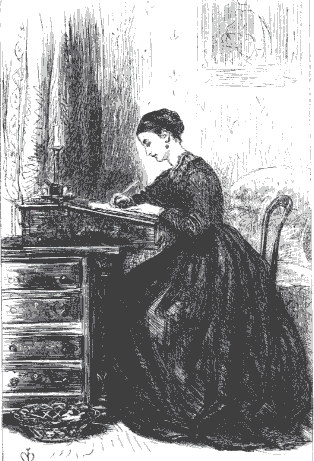
Mary, wife of Phineas, who dies before Phineas Redux begins.
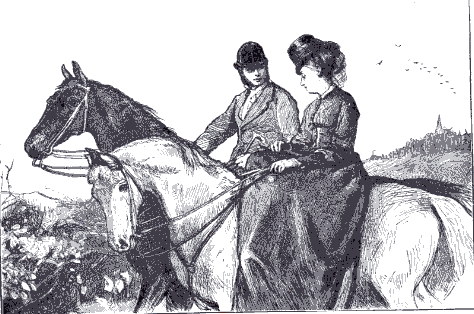
At a fox hunt, one character makes a marriage proposal to another.

Lady Laura
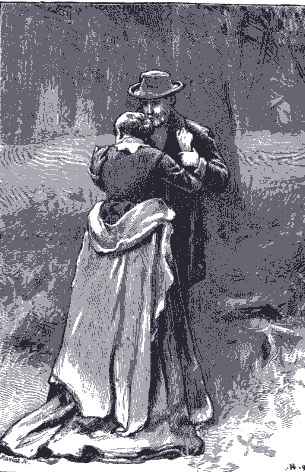
Phineas and Laura
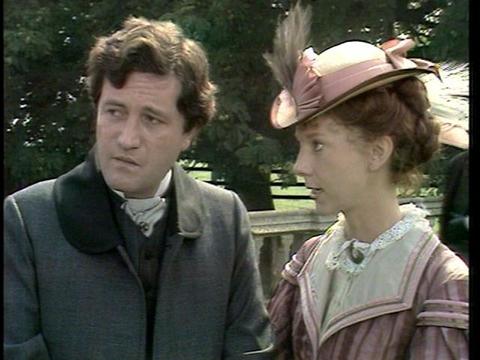
Phineas and Laura, from the 1974 BBC production of the Palliser novels




1 comment:
What a wonderful, knowledgeable post! Why did you stop posting? Looking forward to more posts from your side. :)
Post a Comment